This charming swashbuckler dreamed of aviation since he was a child. He was a figure full of contradictions:an incorrect rookie, a skillful smuggler, but also a war hero and one of the greatest Polish fighter pilots in the history. He was looking for his place on earth until the end of his life. How was his career going?
Jan Eugeniusz Ludwik Zumbach was born on April 15, 1915 in Ursynów, then a small village near Warsaw. He was born into the family of a Swiss immigrant - thanks to this, he had the citizenship of his father's home country.
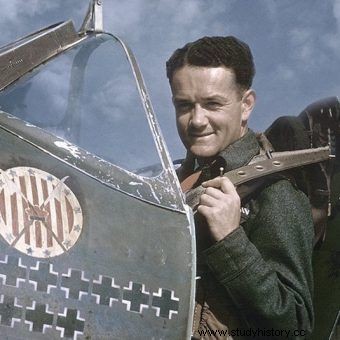
Jan Zumbach had a colorful and adventurous life. The illustration shows a fragment of the cover of the book "The Last Fight".
In 1922, the family of Jan Zumbach moved to an estate in Bobrów near Brodnica, in the then Pomeranian Province. It was there that the boy's fascination with aviation was born. Years later, he replied about it in his memoirs entitled "The Last Fight":
It started with the fact that in clear seasons, every day at eleven o'clock in the morning, a linear plane from the Polish airline company, a three-engine Fokker, flew over our house. I was staring at him so much that my neck hurt .
Then I tried to imitate the flight of an airplane, running with my arms horizontally outstretched and my voice making the sound of its engines. I ran until I was out of breath to the shore of the lake; there I fell, extremely exhausted, into the grass. Panting with exhaustion, clenching my fists and teeth, I repeated angrily:I'll also be a flyer!
This childhood dream came true when, in 1936, Jan was admitted to the Aviation Cadet School in Dęblin. Within the walls of this respectable university, he made friends with Mirosław Feric and Witold Łokuciewski. Although the future aces of Polish aviation were initially interested mainly in "women, wine and singing - and finally science", Zumbach turned out to be an excellent pilot. In 1938 he graduated from the Aviation Cadet School in Dęblin. Soon he was assigned his first assignment to an air combat unit - the elite 111th Tadeusz Kościuszko Fighter Squadron in Warsaw.
Jan Zumbach - Sikorski's tourist
At that time, the turmoil of war was already looming over Poland. However, due to fate, Lieutenant Jan Zumbach did not take part in the first air fights of the Second World War. All because on May 26, 1939, he had an air accident. On September 1, he found him convalescing in Zaleszczyki, a popular resort near the border with Romania in the interwar period. The young officer quickly escaped from Zaleszczyki, trying to join his mother unit. When he failed, miraculously captured a small tourist aircraft RWD-13 made several liaison flights for land units of the Polish Army .
Soviet aggression on September 17 fell on him like a bolt from the blue. By a twist of fate, he was in Zaleszczyki again. Convinced that the war was already lost, he flew his little plane across the border to Romania. He intended to go to France later and continue fighting for Poland.
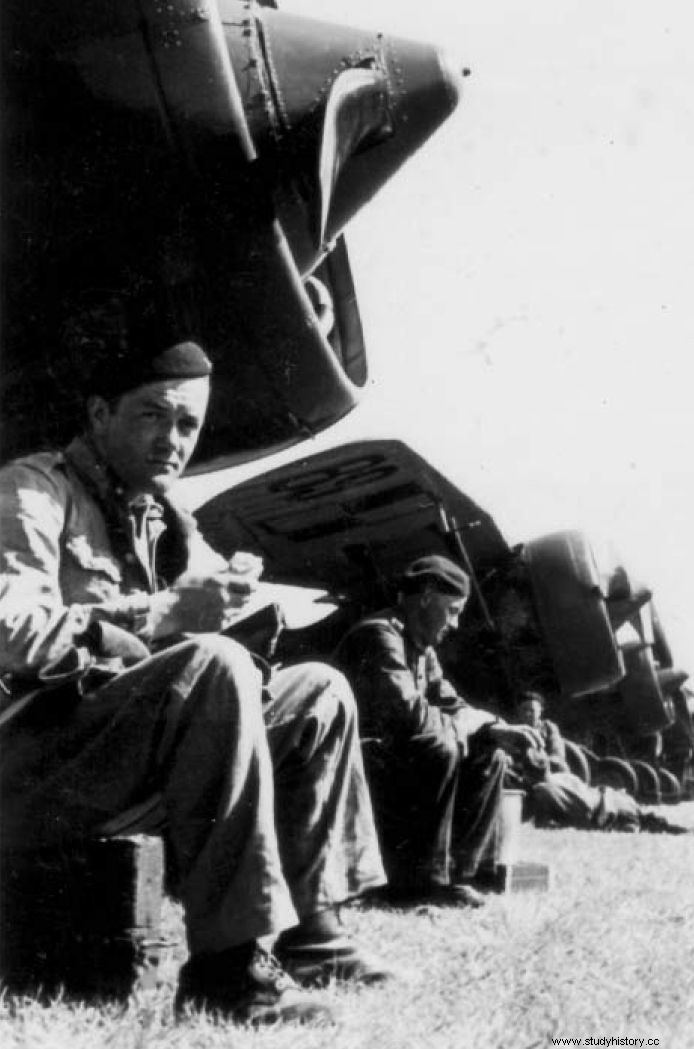
Jan Zumbach in the photo from the period of his education in Dęblin. Illustration from the book "The Last Fight".
This plan was proving to be more difficult than he had anticipated. Faced with imminent internment, he hijacked his own plane from a Romanian military airport . This is how he found himself in Bucharest. Then, thanks to the Polish evacuation mission, with a forged passport (as a "seminarian"!), He reached the Seine by ships via the Black Sea and the Mediterranean.
In France, Zumbach flew Morane Saulnier MS-406 and Marcel Bloch MB-152 fighters. In May 1940, it was included in the so-called chimney key, commanded by Major Zdzisław Krasnodębski. This unit was later incorporated into the French I / 55 Squadron, operating at the Étampes airport, located approximately 50 kilometers south of Paris. On June 12, covering the French ground troops in the formation of four Polish MS-406 units, the Pole was shot down in a clash with 16 Messerschmitt Bf-109s and jumped with a parachute . After the fall of France, he evacuated on the "Kmicic" from Bordeaux to Great Britain.
In defense of the skies over England
The British aviation authorities initially treated Polish pilots with reserve. There was an opinion that Poles should undergo aviation training from the very beginning. They were also not trusted by the fact that the English language was often troublesome for them. The fighters from the Vistula River were amazed and furious. "The English wasted our time on childish things, and yet we were all professional pilots" Zumbach scoffed. Finally, on August 2, 1940, he was assigned to the Polish Fighter Squadron 303. And along with his countrymen, he quickly showed the distrustful sons of Albion during the Battle of Britain how much they were worth.
His first victory, a double one, was on September 7, 1940. Eleven Hurricanes of Squadron 303 then took off from Northolt base to intercept the massive expedition of a thousand Luftwaffe machines to London. The raid was watched by the Reichsmarschall Hermann Göring himself from the cliffs of Calais. Our fighter ace described the details of that memorable flight in the chronicle of 303rd Squadron:
Below me, I saw Do.17, or Do.215, which jumped off pattern. I got on his tail. At this point, the adolfiak shot a short serial in me. A short one, because it seems that at my first shots, his soul was stuffing him into the Land of the Eternal Spirits, into the embrace of good Manitou. The second series was not successful. Only the third, very long one, started the right engine and Dornier crashed .
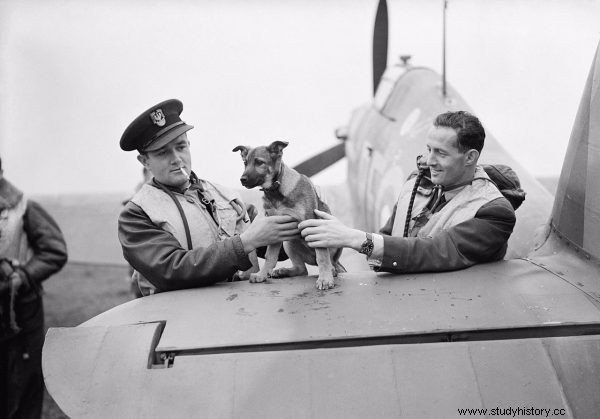
Jan Zumbach (with a cigarette) in the photo from October 1940.
Jan Zumbach also looted another Dornier Do-215 bomber that day. By September 27, 1940, had shot down a total of 8 enemy planes, earning the title of "fighter ace" . In recognition of his services during the Battle of Britain, he was awarded the Silver Cross of the Order of Virtuti Militari and the British Distinguished Flying Cross.
Sky struggles and heartfights
Zumbach, called "Johnny" and "Donald Duck" in the aviation circles of brothers and friends, became famous not only as an excellent fighter. He was also known for his entertaining lifestyle. Evenings at the "Orchard Inn" near Northolt, where Polish pilots soothed the sea of whiskey and champagne fun with fun, made the evenings at the "Orchard Inn" near Northolt a legend. Jan played first violin there - he had a very strong head anyway.
John Kent, a Canadian officer assigned in the initial period to the 303rd Squadron, considered himself a real honor to keep up with the Pole on a certain binge drinking. As he said:“at three in the morning, the only two still standing on our feet were the two of us:Johnny Zumbach, (...), and me. And I took him to bed! ".
Our brave aviator, always a joking and ruthless mocker, was also particularly sensitive to the charms of the fair sex. Especially that the islanders were, as he wrote, "nice, accessible and friendly" and "danced and caressed more willingly with foreign pilots than with their own".
Meanwhile, the war continued. However, its character changed, and the Luftwaffe gradually lost its dominant position in the air. Eventually, the Allies began sending their planes over the occupied continent. Johnny had more victories. On October 13, 1941, while escorting bombers over France, he shot down a Messerschmitt Bf-109. In August 1942, during the fighting at Dieppe, he knocked down two more enemy machines.
In the meantime, he was promoted and climbed to higher and higher levels of the military career of the Polish air force:from the commander of the 303rd Squadron, through various staff functions (on April 15, 1943, he became the commander of the 3rd Polish Fighter Wing. During this period, he graduated from the Higher Aviation School. rank of Squadron Leader. From August 4, 1944 to January 30, 1945 he commanded the 133rd Polish Fighter Wing. On January 30, 1945 he was transferred to the 84th Hunting Group)
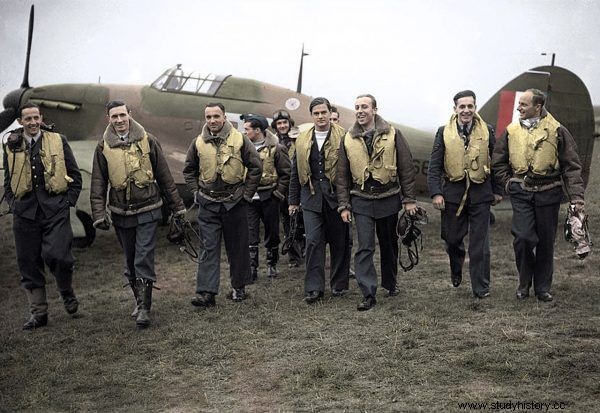
303 Squadron pilots. Zumbach, who has just returned from a mission, goes last.
Zumbach's last war adventure had a rather unusual course. Four weeks before the end of the war, after a lavish party at the Polish air force on the continent, he decided to return to England by a small liaison plane. Unfortunately, being a bit "under the throttle", took the opposite course than it should and ... flew through the front line! For lack of fuel, he had to land - and so he was taken prisoner on April 7, 1945.
He was held in a POW camp on the Dutch island of Terschelling. Even in this situation, our flying ace did not lose heart. Faced with the end of the war, he demanded to see the camp commander and worked on him until the latter agreed to surrender to him the German garrison on the island!
Mister Brown and the smuggler
When the war ended, Jan Zumbach had 12 ½ shot down enemy machines and a number of military decorations to his credit. In addition to the Silver Cross of the Order of Virtuti Militari No. 8825, he was awarded four times with the Cross of Valor, twice with the Air Medal, Field Pilot's Mark No. 431 and twice with the British Distinguished Air Cross (DFC with Bar). He also received a commemorative Star 1939-1945, Medal for the War of 1939-1945 and Medal of Defense.
How many soldiers of the Polish Armed Forces faced the dilemma then - what next? Should we return to the country ruled by communists or decide to emigrate? Johnny chose the latter - it was made easier by the fact that he had a Swiss passport. In October 1946 he left the military service and went to live in Switzerland.
Two years after the war, he founded an aviation company. He officially provided transportation services - but in reality his company smuggled gold, alcohol, cigarettes and weapons in Europe . A Polish veteran even transferred Jewish fighters to Haifa so that they could join the fight to create Israel.
When, due to the dishonesty of his partner and a few unfortunate coincidences, the enterprise collapsed, the former commander of the 303rd Squadron tried to do various jobs. He was, among others, the director of a towel production company, he also ran his own restaurant and disco in Paris. In 1961, he became a mercenary in Africa. As Johnny "Kamikaze" Brown or Mister Brown he started organizing the aviation of Katanga, the rebel province of Congo under the leadership of Moise Czombé . After the defeat of secession, which - to put it mildly - he did not make a profit, he returned to Paris.
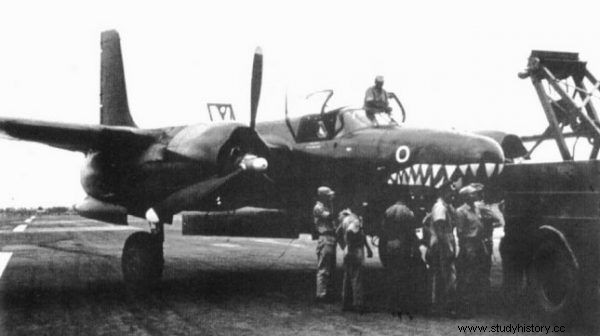
Zumbach's plane, which he sowed terror in the ranks of the Nigerian army. Picture from the book "The Last Fight".
In 1967, this restless spirit re-engaged in the African adventure and went to fight, this time for the "independence" of Biafra, a province that was trying to become independent from Nigeria. His two old, cottage-armed Douglas A-26 stormtroopers and one good-natured Dakota DC-3 were feared in the ranks of the Nigerian army .
After the collapse of secession, Jan Zumbach returned to Europe and for many years he conducted various, sometimes quite secretive businesses. In the first half of the 1980s, he stayed in Poland several times. Taking advantage of his acquaintance with General Edwin Rozłubirski, he planned to establish a Polish company. Jan Zumbach died on January 3, 1986 in Paris, under not entirely clear circumstances. He was buried at the Powązki Military Cemetery in Warsaw.
